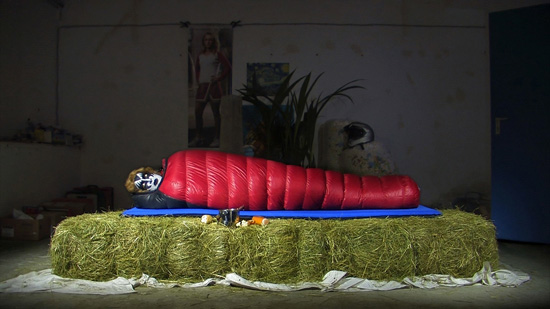Dump Time. For a Practice of Horizontality
Shedhalle / Exhibitions / Dump Time

Stefan Panhans: If A Store Clerk Gave Me Too Much Change”, 2009
Dump Time. For a Practice of Horizontality
Opening: Friday 4 March 2011, 7pm
Exhibition: March 5 – May 15, 2011
Curated by Anke Hoffmann and Yvonne Volkart
Events:
/ Performance “Pink Noise/Fishing for Sound”, Friday March 4, 8 pm
/ Lecture Alexei Penzin “Sleep, Politics and Subjectivity” (in English), Wedn. March 30, 7 pm
/ Dance Performance “Dumped Dreams”, Wednesday March 30, 9 pm
/ Open Discussion “Sleep as practice of resistance?” (in English), Thursday March 31, 4–7 pm
/ Reading of «wir schlafen nicht» by Kathrin Röggla (in German), Friday, 6 May, 7.30 pm
/ Performative Event by “bolwerK” by Marthe van Dessel (in English), Friday, 13 May, 7 pm
Guided Tours:
/ Guided Tour with Anke Hoffmann, Sunday March 20, 3 pm
/ Guided Tour with Anke Hoffmann and Yvonne Volkart, Wednesday March 30, 6 pm
/ Guided Tour with Angela Wittwer, assistant curator, Thursday Mai 5, 6 pm
This exhibition project will be concerned with the philosophical, critical and political aspects of sleep beyond ist pure biological fact.
We have become a sleepless society, we even speak of the 24 hours society. Thus, sleep represents the other side, the dark side of the daytime, with its ratio, economics, and business time. Sleep and dream have uncanny aspects, they deal with loss: loss of control, of subjectivity; they are about devotion, about becoming other. In this sense sleep is similar to the experience of passages, like death, hallucination, or being high. With these archaic and mythic dimensions, sleep represents something totally different to modern time, which is always experienced as an awakened alert time. It is something horizontal, it rejects our projections of the subject as a standing vertical „man“, like a rock. But it also contradicts our ideas of political and activist action and agency: How can sleepers change the world?
With this project, we want to think about these unproductive, senseless, and mad dimensions of sleep and their effects on our daily life. The sleeping ego cannot be controlled. Thus, we say, sleep contains recalcitrant, and critical moments. A passive way of resistance though, rather distinguished by deprivation, failure, or disobedience than revolution.
It was these critical, political and even revolutionary dimensions of sleep and dream, which were important for the surrealists, and their poetics of sleeping and dreaming. Walter Benjamin precisely recognised and described this deeply critical aspect of the surrealistic artistic practises and their political ideologies.
In our project, we refer to these critical ideas, and try to adapt them to our after modern, neoliberal 24 hours society. We want to know if the idea of sleep as opposed to the dominant fiction of the always-working subject is still an important factor? If so, how does a new poetics and esthetics of sleep look like? What about ideas of resistance? What about similar categories of hallucination, trance, ecstasy, or being high, which usually represent ideas of escape?
